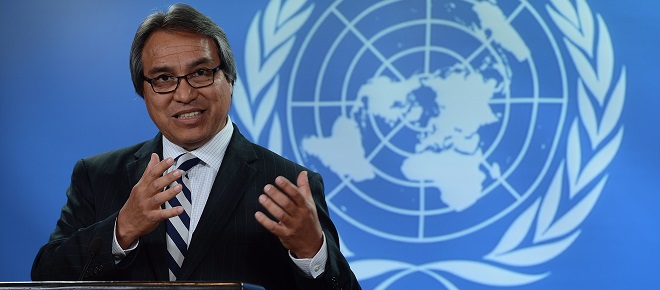UN rapporteur says Canada faces an aboriginal crisis
James Anaya identifies myriad social and economic woes
United Nations Special Rapporteur on the rights of indigenous peoples, James Anaya, holds a press conference at the National Press Theatre in Ottawa on Tuesday, October 15, 2013. He presented his preliminary observations and recommendations on the situation of indigenous peoples in Canada. THE CANADIAN PRESS/Sean Kilpatrick
Share

“Canada faces a crisis when it comes to the situation of indigenous peoples of the country.” — James Anaya, UN Special Rapporteur on the rights of indigenous peoples
James Anaya didn’t tell Canadians anything they didn’t already know. The law professor at the University of Arizona just spent nine days in Canada in his capacity as a UN special rapporteur, charged with assessing the quality of life enjoyed by aboriginal Canadians. As his trip wrapped up yesterday, Anaya offered some preliminary conclusions, none of which would surprise anybody who’s even passively paid attention to the plight of Canadian aboriginals.
“The well-being gap between aboriginal and non-aboriginal people in Canada has not narrowed over the last several years, treaty and aboriginals claims remain persistently unresolved, and overall there appear to be high levels of distrust among aboriginal peoples toward government at both the federal and provincial levels,” wrote Anaya.
The rapporteur pointed to work that should be done to improve living conditions on reserve, discourage suicide, improve service funding, examine disproportionate incarceration rates, fully document the miserable history of residential schools, launch an inquiry into missing and murdered aboriginal women, improve educational outcomes, mitigate family violence and unemployment, invest in self-governing capacity, expedite treaty claim negotiations, and develop a common vision for achieving all of these things.
Worthy goals, no doubt, though the feds will certainly pick and choose their own priorities from that daunting list. But fixing problems is about more than government taking action, wrote Anaya, repeating the claim that drove to the heart of Idle No More’s discontent earlier this year. “Unless legislative and other government actions that directly affect indigenous peoples’ rights and interests are made with their meaningful participation, those actions will lack legitimacy and are likely to be ineffective,” he wrote.
Easier said than done, that. The federal government and many aboriginal leaders sometimes disagree fundamentally about the definition of “meaningful participation.” Bridging that gap is a monumental task, among the most difficult anyone in aboriginal affairs can tackle. Perhaps Anaya already knows that, and perhaps he’ll suggest solutions in his final report that the government and aboriginal leaders can rally around. Perhaps.
What’s above the fold
| The Globe and Mail | Ontario may launch its own pension program. |
| National Post | Arsala Jamal, an Afghan governor who’d lived in Canada, was assassinated. |
| Toronto Star | Toronto police aren’t trained to deal specifically with the mentally ill. |
| Ottawa Citizen | Elections Canada will draw wisdom from a big-name advisory group. |
| CBC News | Congress is still negotiating a deal to extend the country’s debt limit. |
| CTV News | Stephen Harper hosted an event in NYC that cost taxpayers over $65,000. |
| National Newswatch | A deal on cheese might be the final obstacle in Canada-EU trade talks. |
What you might have missed
| THE NATIONAL | Citizenship. Deepan Budlakoti says he’s a Canadian citizen who was born in Ontario and, at one point, issued a passport. The feds say when Budlakoti was born, his parents worked at the Indian High Commission—meaning he didn’t qualify for citizenship. Indian officials say he’s not an Indian citizen. Budlakoti wants the government will admit he’s Canadian. |
| THE GLOBAL | Iraq. A new study claims that over 460,000 Iraqis died between the U.S. military intervention in 2003 and June 2011. The researchers behind the report come from four universities in three countries, including B.C.’s Simon Fraser University. Their tally is four times higher than the ongoing totals estimated by Iraq Body Count, which tracks daily deaths. |
| THE QUIRKY | Bonnie and Clyde. Two teenagers who live west of Ottawa led police in two provinces and an American state on a wild goose chase across the Quebec border into Maine. Along the way, they stole a pair of vehicles and outran a U.S. border guard. By the time they were caught in the Carrabassett River, the pair had travelled more than 500 kilometres from home. |